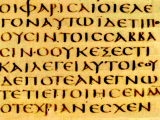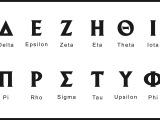Posted by Chris with a “C” I am very excited to announce “Linguistics and the Greek Verb: Recent Discussions and their Implications for NT Exegetes” — a Greek linguistics conference taking place in Cambridge, England, this July! The aim of the conference is to bring together NT scholars, linguists, and Classicists to discuss the Greek verbal … Continue reading
Tagged with biblical languages …
How We Got to Where We’re Going: A Story
Posted by Chris with a “C” Some may have seen my cryptic tweet the other day: I hope I did not keep too many in suspense for too long. … and I hope you do not mind being kept in suspense a little bit longer. I would like to tell you a story … … Continue reading
Paul the Paraphraser or Paul the Septuagint-Quoter?
Imagine you are listening to a sermon during which the preacher says in passing, “Here, Paul quotes the Old Testament.” There is nothing out of the ordinary here. Paul quotes the OT all the time. Imagine again that you are listening to a sermon. This time, however, the preacher says, “Here, Paul paraphrases the Old … Continue reading
Word Order in Septuagint Judges
Most of the time, if you were to sit down, open up your Hebrew Bible and Greek Old Testament, and read them side-by-side (as we all do), it would quickly become clear that the Greek translators were perfectly content to mirror the word order of their Vorlagen (a fancy German word for “source texts” that … Continue reading
Do words have meanings?
Do words have meanings. In short, yes; but technically, no. When I say “tree” you may think of this. But what if I said “trunk”? Would you think of this? Probably not. At least not initially, because I already tricked you into thinking of “trunk” in the sense of how this word is connected to … Continue reading
Beginner Expectations
So, when I first started learning the Biblical Languages back in college I had a somewhat misguided, mystical expectation from the Languages that they would lead me to serene truths and novel realizations—all of the time. I think this is normal for beginner students, or for those whose only knowledge of the Languages is from … Continue reading





